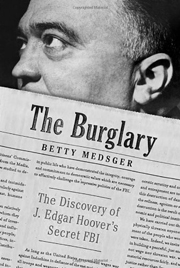 Ordinary People
Ordinary People
The Burglary: The Discovery of J. Edgar Hoover’s Secret FBI
Knopf Doubleday, 2014
by Betty Medsger
Reviewed by Rosalie G. Riegle
Read this book! Nothing any review can say will substitute for the stunning accumulation of evidence of our government’s surveillance presented in Betty Medsger’s The Burglary. Read and then ask the questions Medsger suggests in her closing chapter. Then request your own FOIA files as the WRL is doing. For we are all ordinary people and we can all act to counter our stifling surveillance society, as did the courageous men and women whose actions are described in Medsger’s massive work.
And it is big, both physically and metaphorically, spanning the shameful Palmer Raids of 1919 up through the revelations of NSA whistleblower Edward Snowden. It’s a big book in its purpose—a warning that we are in grave danger from our own government, danger as grave as that in 1971 which moved eight nonviolent war resisters to steal FBI records in Media, Pennsylvania. Then, as now, surveillance was on every peaceworker’s mind. In fact, Medsger writes that instilling paranoia in activist circles was a primary FBI goal. A Hoover directive read, “Enhance the paranoia ... get the point across there is an FBI agent behind every mailbox.” Today, it’s internet and cell phone spying that has everyone spooked.
In 1971, the Vietnam War was still raging, in spite of increasingly vehement opposition. Draft board raids continued, with some of these draft file destruction actions no longer the “stand around” variety championed by Phil Berrigan and others. Some resisters had moved to clandestine actions where they attempted to throw a cog in the war machine without being arrested. When nonviolent activist and physics professor William Davidon realized that exposing the FBI might result in reforms, he asked eight resisters to join him in an audacious and dangerous action—to break into an FBI office and steal documents that would show how the Bureau operated.
The story of the break-in, the get-away, and the group’s amazing discoveries makes for exciting reading in the tradition of the best crime novels. So do the expensive and bizarrely inept efforts by the FBI to apprehend the criminals and restore its damaged image. The FBI failed and the burglars were neither identified or captured. The activists had trusted Betty Medsger in 1971 when they mailed copies of the FBI files to her as a reporter at The Washington Post. Two of the burglars— Betty and John Raines-- trusted her again years later after they accidentally revealed to her their identity. The details tumbled out - how they planned the burglary for the night of the boxing championship fight between Muhammed Ali and Joe Frazier when they knew that most of the country would be glued to television; how Bob Forsyth almost cancelled the action after he couldn’t get into the front door of the office; how nervous John Raines was when the FBI visited him and asked him point-blank if he had been involved; and how deeply grateful the couple was that they had been able to pull it off and not get caught. Several weeks after the revelation, Medsger called and asked if she could publish the full story. They agreed, and she was able to find all but one of the burglars. Again, they trusted her and she was able to interview all seven.
Three aspects make this book especially significant. One is the candor with which the burglars, ordinary people all, share their personal stories after so many years of silence, speaking freely of their lives then and their lives now. Another is the description of the government’s mostly lackluster attempts at surveillance oversight, despite the reforms the Senate’s Church Commission instituted in 1975. A third is the connection Medsger makes with our present-day surveillance state. Exhaustive endnotes and a bibliography direct us to further reading in surveillance and its consequences. In her Acknowledgments, Medsger applauds Joanna Hamilton for her film 1971, commenting on how heartening it is to work with an artist who has the same goals - stimulating ordinary citizens to “take responsibility for their government’s actions.”
During Hoover’s time, the favorite government targets were African American communities (whether activist or not), students, intellectuals, and peace groups. Today everyone is fair game. Where are the ordinary people willing to risk their livelihoods, as the Media burglars did, to preserve what’s left of our freedom?



